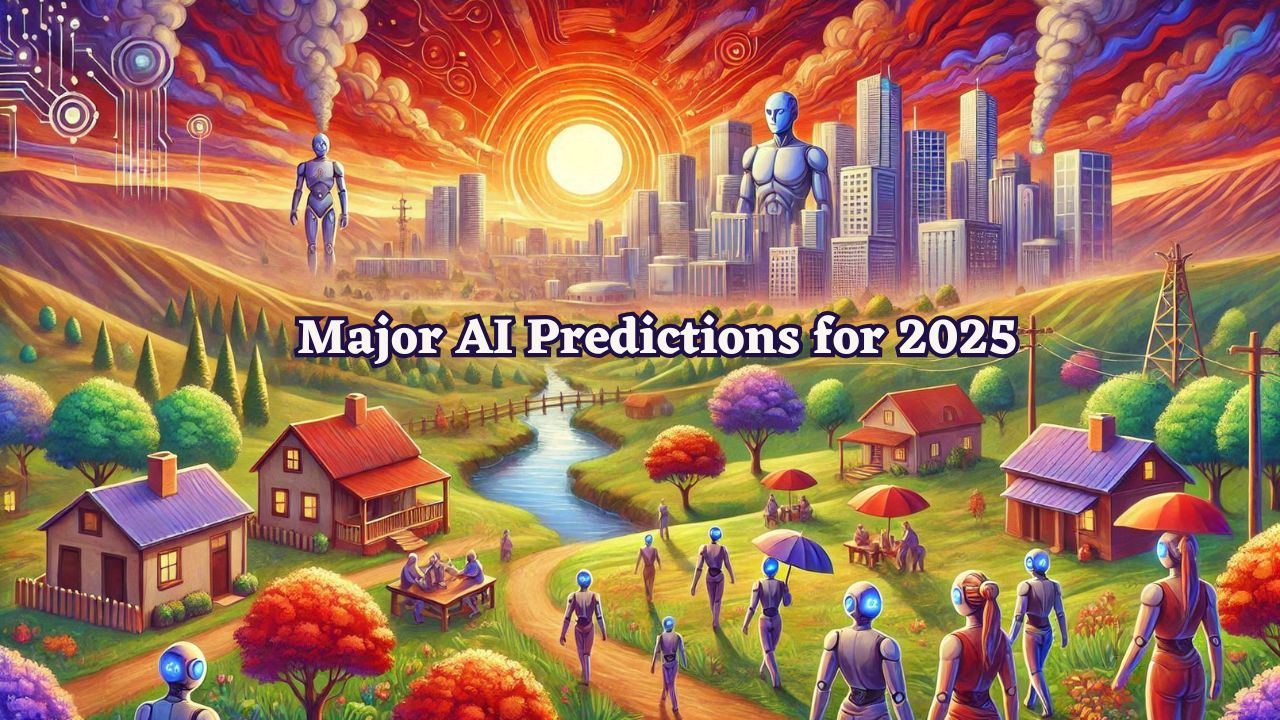
Major AI Predictions for 2025#
Listen Summary of this in Podcast Format#
AI Predictions for 2025#
1. AI Agents and Autonomous Tools#
- AI agents will become ubiquitous, capable of autonomously performing tasks like booking flights, scheduling meetings, or managing workflows. The term “agentic” will become commonplace.
2. AI Integration in Everyday Life#
- AI technology will be embedded into household appliances (e.g., refrigerators, ovens, and laundry machines) and wearables (e.g., sunglasses, earbuds) for enhanced functionality. Human and appliances will be able to talk with each other.
- Generative AI characters will be introduced on social media platforms for engagement and interaction. These characters will adopt different styles and personalities.
3. Growth in AI Wearables#
- Smart wearables like heads-up display glasses and earbuds offering real-time translation will gain popularity.
- You will be able to learn language easily while talking with your wearables.
4. Video Models and Content Creation#
- AI video generation models will advance to the point where AI-generated videos become indistinguishable from real ones, potentially passing the “Visual Turing Test.”
- AI tools for converting long-form videos into short clips will make content creation easier for creators.
- AI will also play a covert or overt role in movie production, possibly resulting in AI-created movies becoming a trend.
5. AI in Entertainment and Gaming#
- AI-driven entertainment robots and video content will grow, enabling creators to produce work faster.
- Gaming technology advancements will include dynamic resolution upscaling through deep learning super sampling (DLSS). It uses deep learning algorithms to upscale lower-resolution images to higher resolutions, enhancing the visual quality of games without significantly impacting performance. This allows for higher graphical settings and smoother frame rates, making games look better and run more efficiently
6. Self-Driving and Autonomous Vehicles#
- Significant developments in self-driving technology, with advancements from companies like Tesla, Waymo (google), and Lyft (Amazon). Tesla might achieve unsupervised full self-driving capabilities.
7. Quantum Computing Progress#
- Breakthroughs in quantum computing with new chips from Google and IBM.
8. AI in Workspaces and Business#
- AI integration into workspaces for streamlined operations and minimal supervision.
- Businesses will increasingly rely on AI for operational efficiency and innovation.
9. Challenges of AI-Generated Content#
- Proliferation of low-quality, AI-generated content flooding platforms (termed “AI slop”), leading to potential SEO penalties and a need for better content regulation.
- SEO business will be completely revamped
- Ethical challenges in discerning AI-generated content from real content will drive the need for verification systems.
- People will become less reactive to even real videos/audio/content, because of the flood of AI-generated content.
10. AI Ethics, Regulation, and Identity Verification#
- Growing discussions on ethics and regulations around AI, particularly with the emergence of personal AI assistants and concerns over privacy and bias.
- Blockchain-based “proof of personhood” solutions to verify identities in the face of AI advancements. This year Blockchain will enter into the mainstream along with AI app development.
11. Hybrid Creativity#
- AI will evolve as a creative partner in art, music, and content creation, enabling “hybrid creativity” between humans and machines.
- To create content whatever technology and tools you need, you can use those easily with AI copilots and AI assistants.
12. Extended Reality (XR)#
- XR technologies will become mainstream, particularly through compact, user-friendly devices like AI-powered glasses.
- AI will enter into the realm of virtual reality (VR) and augmented reality (AR) to provide immersive experiences.
13. Regenerative Medicine#
- AI-driven advancements in regenerative medicine, although progress might be slowed by legal and ethical challenges.
14. Customizable Social Media Algorithms#
- Social media platforms may offer users the ability to fine-tune their algorithms for a personalized experience.
15. AI Compute and Applications#
- GPU power will increase more and they will become cheaper and widely available for local AI workloads.
16. AI in Programming#
- AI will be commonly used for product development, architecture, UML, code completion, code refactoring, debugging, and testing. So, the cost and time of development will reduce and quality will improve.
- AI written code will selfheal if it is failing, improve for performance and security.
Related Readings#
My 2020, article on 100+ AI Usecase - Future Predictions for AI


Comments: